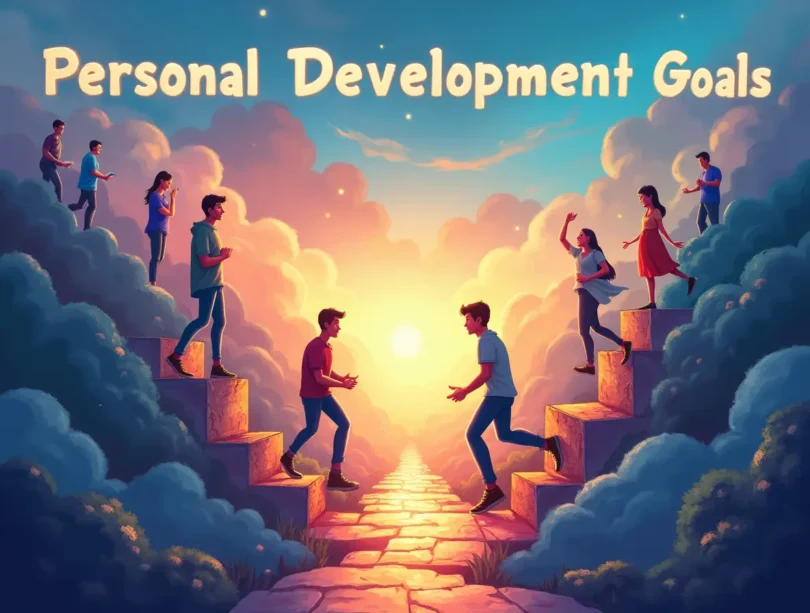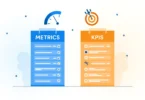Personal development is the key to unlocking your full potential and creating a fulfilling life. Whether you want to improve your mindset, enhance your skills, or build better habits, setting personal development goals provides a clear direction for growth. These goals act as a roadmap, guiding you toward success in different areas of life—be it career, relationships, health, or emotional well-being.
But growth doesn’t happen by chance—it requires intentional effort. By setting clear, actionable goals, you take control of your journey, push past limitations, and create meaningful changes. In this blog post, we’ll explore powerful personal development goals that can transform your life and help you become the best version of yourself.
Headlines
The Importance of Setting Personal Development Goals
10 Powerful Personal Development Goals to Transform Your Life
How to Stay Committed to Your Personal Development Goals
The Importance of Setting Personal Development Goals
Why Personal Development Goals Matter
Personal development goals are more than just aspirations; they serve as a roadmap for self-improvement and success. Without clear goals, personal growth becomes vague and directionless, making it difficult to achieve meaningful progress.
1. They Provide Clarity and Direction
Setting personal development goals helps you define what you want to achieve in different areas of your life—be it career growth, mental well-being, relationships, or productivity. Without specific goals, you might find yourself stuck in a cycle of routine without making real progress.
For example, someone who wants to improve their emotional intelligence can set a goal like, “Practice self-awareness by reflecting on my emotions daily and identifying triggers.” This turns an abstract idea into a clear, actionable step.
2. They Increase Motivation and Accountability
When you have well-defined personal development goals, you create a sense of purpose that fuels motivation. Goals give you something to work toward, which makes it easier to stay committed, even when faced with challenges.
Furthermore, tracking progress towards your goals can keep you accountable. Whether you use a goal-tracking app, a journal, or an accountability partner, having a system in place ensures you stay focused and adjust your approach when needed.
3. They Foster a Growth Mindset
A growth mindset is the belief that skills, intelligence, and abilities can be developed through dedication and effort. When you set and pursue personal development goals, you naturally shift your mindset toward continuous improvement.
For example, instead of thinking “I’m just bad at public speaking,” you start believing, “With consistent practice and feedback, I can improve my speaking skills.” This mindset helps overcome self-limiting beliefs and encourages lifelong learning.
4. They Improve Emotional Intelligence and Resilience
Personal development goals often focus on improving self-awareness, self-regulation, motivation, empathy, and social skills, which are key components of emotional intelligence (EQ). A strong EQ helps you navigate challenges with greater resilience and enhances relationships in both personal and professional life.
For instance, setting a goal like “Pause and reflect before reacting to criticism” can help you develop emotional control, leading to better decision-making and interpersonal interactions.
5. They Enhance Productivity and Time Management
Without personal development goals, it’s easy to waste time on unproductive habits. Goals encourage you to prioritize tasks that align with your values and ambitions. Implementing time management techniques like the Pomodoro Technique, time blocking, or the Eisenhower Matrix can help structure your day efficiently and maximize productivity.
The Best Time Management Strategies for Busy Professionals
6. They Lead to a More Fulfilling Life
Ultimately, personal development goals guide you toward a more meaningful and fulfilling life. They allow you to:
- Recognize and leverage your strengths
- Overcome weaknesses and challenges
- Achieve balance in mental, emotional, and physical well-being
- Experience a sense of accomplishment
By consistently setting and working toward these goals, you cultivate a lifestyle of continuous self-improvement that brings lasting personal and professional success.
How to Set SMART Personal Development Goals
Setting personal development goals isn’t just about writing down dreams or vague aspirations. To turn them into reality, they must be structured, clear, and actionable. That’s where the SMART goal framework comes in. SMART stands for Specific, Measurable, Achievable, Relevant, and Time-bound—five essential criteria that make goal-setting effective.
1. Specific: Define Your Goal Clearly
A common mistake in personal development is setting vague goals like “I want to be more confident” or “I want to improve my communication skills.” While these are great aspirations, they lack direction.
A specific goal clearly defines what you want to accomplish, why it matters, and how you will achieve it. Ask yourself:
- What exactly do I want to achieve?
- Why is this goal important to me?
- What steps will I take to accomplish it?
✅ Example: Instead of “I want to be more confident,” say, “I will improve my public speaking confidence by practicing for 10 minutes daily and joining a Toastmasters club.”
2. Measurable: Track Your Progress
Measuring progress is crucial because it keeps you motivated and accountable. Without a clear way to track success, you may lose focus or feel like you’re not making progress.
To make your goal measurable, consider:
- How will I track my progress?
- What metrics or indicators will show I am improving?
- How will I know when I’ve reached my goal?
✅ Example: If your goal is to improve emotional intelligence, a measurable approach could be: “I will read two books on emotional intelligence within three months and apply one new self-regulation technique per week.”
3. Achievable: Set Realistic Yet Challenging Goals
Goals should be ambitious enough to inspire growth but realistic enough to be attainable based on your current situation, resources, and time. Setting unrealistic goals—like becoming a fluent speaker of a new language in a month—leads to frustration and discouragement.
To ensure your goal is achievable, ask:
- Do I have the resources, skills, and time to achieve this?
- What obstacles might I face, and how can I overcome them?
- Can I break this goal into smaller, more manageable steps?
✅ Example: Instead of “I will meditate for one hour every day,” start with “I will meditate for 5 minutes every morning and gradually increase to 20 minutes within three months.”
4. Relevant: Align Your Goals with Your Life Vision
Your personal development goals should align with your broader aspirations and values. If a goal isn’t meaningful or doesn’t contribute to your growth, you may lose motivation.
Ask yourself:
- Does this goal align with my personal or professional growth?
- Will achieving this goal bring me closer to the life I want?
- Why is this goal important to me?
✅ Example: If your long-term goal is to improve work-life balance, a relevant goal might be: “I will set a boundary to stop checking emails after 7 PM to reduce stress and spend more time with family.”
5. Time-Bound: Set a Deadline for Completion
A goal without a deadline is just a wish. Time-bound goals create urgency and help you stay focused. Setting a clear timeline also makes it easier to evaluate progress and make adjustments when necessary.
To make your goal time-bound, ask:
- When do I want to achieve this goal?
- What milestones can I set along the way?
- Is this timeline realistic for my lifestyle and commitments?
✅ Example: Instead of “I will read more books,” say “I will read one book on personal development every month for the next six months.”
Putting It All Together: A SMART Goal Example
❌ Weak Goal: “I want to be healthier.”
✅ SMART Goal: “I will exercise for 30 minutes, five days a week, for the next three months by following a structured workout plan and tracking my progress in a fitness app.”
Final Tips for Setting SMART Personal Development Goals
- Write your goals down – Studies show that written goals are more likely to be achieved.
- Break large goals into smaller steps – This prevents overwhelm and helps maintain momentum.
- Stay flexible – If life throws unexpected challenges, adjust your goals rather than abandoning them.
- Celebrate milestones – Recognizing small wins keeps you motivated and engaged in the process.
By applying the SMART framework, you can set clear, actionable, and effective personal development goals that lead to meaningful transformation.
10 Powerful Personal Development Goals to Transform Your Life
Personal development is a lifelong journey of learning, growth, and self-improvement. Setting clear and meaningful personal development goals can help you become the best version of yourself, boosting your confidence, resilience, and overall well-being. Below are ten powerful goals that can transform your life by enhancing your mindset, productivity, relationships, and emotional well-being.
1. Cultivate a Growth Mindset
A growth mindset, coined by psychologist Carol Dweck, is the belief that skills and intelligence can be developed through effort and learning. People with a fixed mindset see challenges as obstacles, while those with a growth mindset see them as opportunities.
🔹 How to achieve this goal:
- Embrace failures as learning experiences.
- Replace negative self-talk with positive affirmations.
- Continuously seek knowledge through books, courses, and mentorship.
🔗 Mindset: The New Psychology of Success by Carol Dweck – Learn about the power of a growth mindset and how it influences success.
2. Improve Emotional Intelligence (EQ)
Emotional intelligence is the ability to understand, manage, and express emotions effectively. A high EQ enhances relationships, decision-making, and resilience during stressful situations.
🔹 How to achieve this goal:
- Practice self-awareness by journaling emotions daily.
- Develop empathy by actively listening to others.
- Learn techniques for emotional regulation, such as deep breathing or mindfulness.
3. Master Time Management
Effective time management allows you to accomplish more in less time, reducing stress and increasing productivity. By prioritizing tasks, you can make space for personal growth and self-care.
🔹 How to achieve this goal:
- Use the Pomodoro Technique to work in focused intervals.
- Plan your day using a to-do list or productivity planner.
- Eliminate distractions by setting boundaries around digital device usage.
4. Strengthen Your Communication Skills
Clear and confident communication is essential in both personal and professional relationships. Whether it’s expressing thoughts clearly, resolving conflicts, or networking, communication skills are crucial for success.
🔹 How to achieve this goal:
- Practice active listening by fully engaging in conversations.
- Improve public speaking skills by joining a group like Toastmasters.
- Learn non-verbal communication cues, such as eye contact and body language.
5. Build Resilience and Stress Management Skills
Life is full of uncertainties, but resilience helps you bounce back from setbacks and face challenges with confidence. Learning to manage stress effectively prevents burnout and supports mental well-being.
🔹 How to achieve this goal:
- Develop coping strategies like mindfulness, meditation, or exercise.
- Reframe negative situations into opportunities for growth.
- Seek support from friends, family, or a therapist when needed.
Stress Management & Resilience
🔗 American Psychological Association – Building Resilience – Learn effective ways to develop resilience and cope with challenges.
6. Adopt Healthy Habits for Physical and Mental Well-Being
Your body and mind are interconnected, and a healthy lifestyle directly influences your productivity and emotional state. Investing in your physical and mental well-being leads to long-term benefits.
🔹 How to achieve this goal:
- Follow a balanced diet rich in whole foods.
- Prioritize regular exercise, such as yoga, weight training, or walking.
- Establish a healthy sleep routine to recharge your body and mind.
7. Develop Financial Literacy and Money Management Skills
Financial well-being is a critical aspect of personal development. Understanding how to budget, save, and invest wisely reduces financial stress and helps secure your future.
🔹 How to achieve this goal:
- Create a monthly budget to track expenses and savings.
- Learn about investing, debt management, and passive income strategies.
- Avoid impulsive spending by practicing mindful money habits.
8. Expand Your Knowledge and Skill Set
Lifelong learning keeps your mind sharp and opens doors to new opportunities. Whether it’s advancing in your career or picking up a new hobby, continuous education keeps you growing.
🔹 How to achieve this goal:
- Take online courses on platforms like Udemy, Coursera, or LinkedIn Learning.
- Read books related to self-improvement, business, or psychology.
- Learn a new skill, such as a language, coding, or creative writing.
9. Cultivate Meaningful Relationships
The quality of your relationships has a direct impact on your happiness and emotional well-being. Building strong connections with friends, family, and colleagues enriches your life.
🔹 How to achieve this goal:
- Practice gratitude and express appreciation to loved ones.
- Set healthy boundaries to maintain emotional balance.
- Engage in social activities or community groups to meet like-minded people.
10. Develop Self-Discipline and Accountability
Self-discipline is the ability to stay committed to your goals despite distractions or challenges. It’s what separates dreamers from achievers.
🔹 How to achieve this goal:
- Create a daily routine that aligns with your priorities.
- Eliminate procrastination by setting clear deadlines.
- Find an accountability partner or mentor to track progress.
Final Thoughts: The Power of Personal Development Goals
Personal development is not about perfection but progress. By setting clear, actionable goals in different areas of your life, you create a path toward self-improvement and fulfillment. Whether it’s boosting your confidence, improving relationships, or enhancing productivity, these 10 personal development goals can help you transform your life.
How to Stay Committed to Your Personal Development Goals
Setting personal development goals is just the beginning—the real challenge lies in staying committed and following through. Many people start with enthusiasm but lose motivation along the way. Here’s how you can stay on track and make lasting changes in your life.
1. Create a Clear Action Plan
A goal without a plan is just a wish. Breaking down your goals into actionable steps makes them more manageable and achievable.
🔹 How to do it:
- Write down your goals and break them into small, achievable tasks.
- Set daily, weekly, or monthly milestones to track progress.
- Use a planner, journal, or digital tools like Trello or Notion to stay organized.
2. Build Consistent Habits
Success comes from small, daily actions rather than big, occasional efforts. Developing habits that align with your personal development goals will help you stay consistent.
🔹 How to do it:
- Set a fixed time each day for working on your goal.
- Attach new habits to existing routines (e.g., read 10 pages after your morning coffee).
- Use habit-tracking apps like Habitica, Streaks, or HabitBull to monitor progress.
3. Stay Accountable
Accountability increases motivation and helps you push through challenges. Sharing your goals with someone makes you more likely to stay committed.
🔹 How to do it:
- Find an accountability partner or join a mastermind group.
- Share your progress on social media or a blog.
- Set up regular check-ins with a mentor or coach.
4. Overcome Setbacks with a Positive Mindset
Challenges and failures are part of the journey. Instead of giving up, use them as learning experiences to improve and grow.
🔹 How to do it:
- Reframe failures as opportunities to learn.
- Practice self-compassion and avoid negative self-talk.
- Adjust your approach if needed but never abandon your goal.
5. Reward Yourself for Progress
Celebrating small wins keeps you motivated and reinforces positive behavior. Recognizing your progress helps maintain momentum.
🔹 How to do it:
- Treat yourself when you reach a milestone (a nice meal, a day off, or a small gift).
- Keep a success journal to track and celebrate progress.
- Reflect on how far you’ve come to boost motivation.
Final Thoughts: Stay Focused and Keep Growing
Commitment to personal development requires patience, persistence, and self-discipline. By following these strategies, you can stay on track and achieve long-term success. Remember, progress is more important than perfection!
Personal development is a continuous journey, not a one-time event. The goals you set today shape the person you’ll become tomorrow. Whether you’re working on building resilience, improving communication, or mastering time management, every small step brings you closer to personal fulfillment.
The most important thing is to start. Pick one goal, create an action plan, and commit to growth. Challenges may arise, but with dedication and the right mindset, you can overcome obstacles and achieve lasting transformation.








Leave a Comment